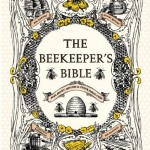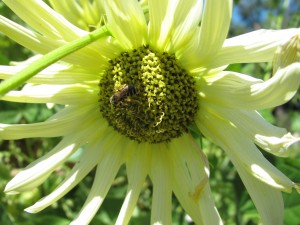 One of my favorite books on books and reading (yes, shocking!) is Anne Fadiman’s Ex Libris: Confessions of a Common Reader–her collected essays regarding her life with books and words. If you can find the little volume, do read it for yourself and see what you think but one concept she talks about is the “odd shelf.” That’s the shelf of books that one collects about a specific topic that seems an unlikely choice. Her topic: polar expeditions. I have several odd shelves but the most crowded one is filled with insect books. A subset is all about bees and beekeeping. No, I don’t keep bees but I sure would like to.
One of my favorite books on books and reading (yes, shocking!) is Anne Fadiman’s Ex Libris: Confessions of a Common Reader–her collected essays regarding her life with books and words. If you can find the little volume, do read it for yourself and see what you think but one concept she talks about is the “odd shelf.” That’s the shelf of books that one collects about a specific topic that seems an unlikely choice. Her topic: polar expeditions. I have several odd shelves but the most crowded one is filled with insect books. A subset is all about bees and beekeeping. No, I don’t keep bees but I sure would like to.
On the odd shelf:
The Hive and the Honey Bee. Dadant & Sons. Methods for the real beekeeper but fascinating nonetheless.
A Book of Bees: And How to Keep Them by Sue Hubbell. A year in the life of a beekeeper with wonderful tangents and autobiographical tidbits.
Plan Bee: Everything You Ever Wanted to Know About the Hardest-Working Creatures on the Planet by Susan M. Brackney. Somewhat like the Hubbell book but a little cutesy and less informed, I guess I’ll say.
Never in a million years would I keep my hypothetical hive in the location she chooses but beekeeping features in Novella Carpenter’s Farm City: The Education of an Urban Farmer.
The Beekeeper’s Bible: Bees, Honey, Recipes & Other Home Uses by Richard Jones & Sharon Sweeney-Lynch. Great color photos with beekeeping explanations plus history.
I’ve not yet read The Beekeeper’s Lament: How One Man and Half a Billion Honey Bees Help Feed America by Hannah Nordhaus (2011) but am looking forward to it. Tell ya later if I like it.
It’s not just about the honeybees which, after all, aren’t native to North America. No, native bees are important too. And, though we hear about honeybees’ Colony Collapse Disorder, native bees are menaced by various threats as well. Learn more and even how to identify some of the different species (bees & other pollinators) in two Xerces Society guides (the Xerces Society is worth checking out as well–their mission is to protect wildlife through the conservation of invertebrates and their habitat):
and
Pollinator Conservation Handbook: A Guide to Understanding, Protecting, and Providing Habitat for Native Pollinator Insects by Shepherd, Buchmann, Vaughan, and Black.
Are you a beekeeper or just a wannabe like me? What related books or websites are you keen on? Oh, and check out The Great Sunflower Project and “Join the Hunt for Bees!”

